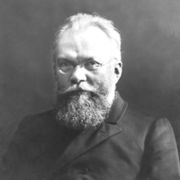
Karl Gottfried Lamprecht
Encyclopedia

Germany
Germany , officially the Federal Republic of Germany , is a federal parliamentary republic in Europe. The country consists of 16 states while the capital and largest city is Berlin. Germany covers an area of 357,021 km2 and has a largely temperate seasonal climate...
historian
Historian
A historian is a person who studies and writes about the past and is regarded as an authority on it. Historians are concerned with the continuous, methodical narrative and research of past events as relating to the human race; as well as the study of all history in time. If the individual is...
.
Lamprecht was born in Jessen (Elster)
Jessen (Elster)
Jessen is a municipality on the Schwarze Elster and lies in the eastern part of Saxony-Anhalt in the district of Wittenberg.-Geography:Jessen is an amalgamated municipality, and has the following subdivisions:-History:...
in the Province of Saxony
Province of Saxony
The Province of Saxony was a province of the Kingdom of Prussia and later the Free State of Prussia from 1816 until 1945. Its capital was Magdeburg.-History:The province was created in 1816 out of the following territories:...
. As a student, he trained in history, political science, economics, and art at the universities of Göttingen, Leipzig
University of Leipzig
The University of Leipzig , located in Leipzig in the Free State of Saxony, Germany, is one of the oldest universities in the world and the second-oldest university in Germany...
, and Münich
Ludwig Maximilians University of Munich
The Ludwig Maximilian University of Munich , commonly known as the University of Munich or LMU, is a university in Munich, Germany...
. Lamprecht taught at the university in Marburg and later at Leipzig, where he founded a center dedicated to comparative world and cultural history (Institut für Kultur- und Universalgeschichte).
Lamprecht studied German and European social and economic history, particularly of the Middle Ages. He aroused considerable controversy with his interdisciplinary methods and focus on broad social, environmental, and even psychological, questions in history. Lamprecht's ambitious Deutsche Geschichte on the whole trajectory of German history sparked a famous Methodenstreit
Methodenstreit
Methodenstreit is a German term referring to an intellectual controversy or debate over epistemology, research methodology, or the way in which academic inquiry is framed or pursued...
(methodological dispute) within Germany's academic history establishment. Lamprecht came under criticism from scholars of legal and constitutional history like Friedrich Meinecke
Friedrich Meinecke
Friedrich Meinecke was a liberal German historian, probably the most famous German historian of his generation. As a representative of an older tradition still writing after World War II, he was an important figure to the end of his life.-Life:Meinecke was born in Salzwedel in the Province of Saxony...
and Georg von Below for his lack of methodological rigor and inattention to important political trends and ideologies. As a result, Lamprecht and his students were marginalized by the German academy and interdisciplinary social history remained something of a taboo among German historians for much of the twentieth century. Lamprecht died in Leipzig.
According to Ernst Breisach,
- Lamprecht himself stipulated psychological forces as the basic forces in all of history. But they derived from the collective psyche of every nation and not from the idiosyncratic forces of individual psyches. Historiography p. 279
Lamprecht found a much more positive reception for his ideas and methods in France and the United States. In 1904, he was invited to give a series of lectures at Columbia University
Columbia University
Columbia University in the City of New York is a private, Ivy League university in Manhattan, New York City. Columbia is the oldest institution of higher learning in the state of New York, the fifth oldest in the United States, and one of the country's nine Colonial Colleges founded before the...
, which were translated and published in 1905 as What is History?
- Lamprecht failed to convince other historians, but a mutant of the idea of a Volksseele intruded into French historiography as the concept of a period's mentality, especially as mentalité or sensibilité in FebvreLucien FebvreLucien Febvre was a French historian best known for the role he played in establishing the Annales School of history. He has designed the Encyclopédie française together with Anatole de Monzie.-Biography:...
's work. Breisach p.342-3
Lamprecht's work was a formative influence in the thinking of the French social historian Marc Bloch
Marc Bloch
Marc Léopold Benjamin Bloch was a French historian who cofounded the highly influential Annales School of French social history. Bloch was a quintessential modernist. An assimilated Alsatian Jew from an academic family in Paris, he was deeply affected in his youth by the Dreyfus Affair...
as well the Annales School
Annales School
The Annales School is a group of historians associated with a style of historiography developed by French historians in the 20th century. It is named after its scholarly journal Annales d'histoire économique et sociale, which remains the main source of scholarship, along with many books and...
. One of his students was Cai Yuanpei
Cai Yuanpei
Cai Yuanpei was a Chinese educator and the president of Peking University. He was known for his critical evaluation of the Chinese culture that led to the influential May Fourth Movement...
, who later served as the chancellor of Beijing University and had an enormous influence on modern Chinese thought.
Select works by Karl Lamprecht
- Deutsches Wirtschaftsleben im Mittelalter, 3 vols., Leipzig 1885-1886 (Aalen 1969)
- Deutsche Geschichte, 12 vols. + 2 incomplete vols., Berlin 1891-1909
- Die kulturhistorische Methode, Berlin 1900

